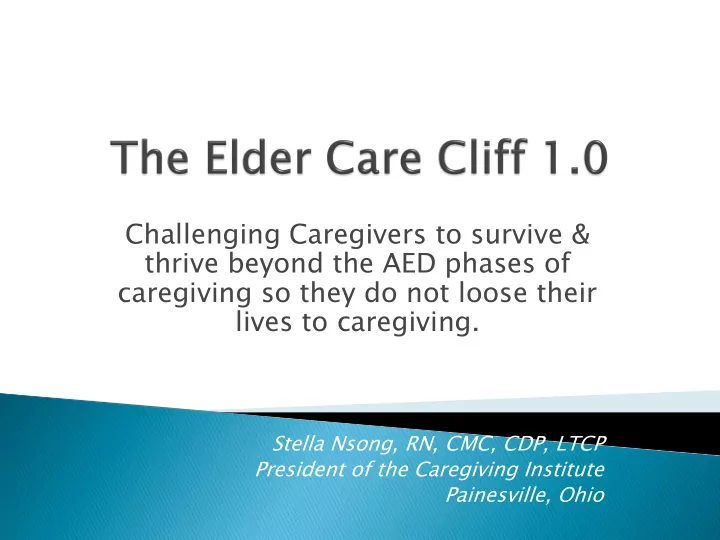

Challenging Caregivers to survive & thrive beyond the AED phases of caregiving so they do not loose their lives to caregiving. Stella Nsong, RN, CMC, CDP, LTCP President of the Caregiving Institute Painesville, Ohio
There are approximately 65 million unpaid family caregivers in the United States. Family Caregivers provide 80% of the long term care in the United States. The Value of the amount of care provided by family caregiver is estimated at 450 billion dollars each year.
45-65 year olds make up the biggest age group in todays place with 22% of them caring for a parent. Besides being unpaid caregivers, the taxes that these unpaid caregivers pay today goes to contribute the federal income that is used to fund Medicaid services.
What would happen to the Medicare & Medicaid health care system today if the government had to pay 650 billion dollars each year?
There are three phases of Caregiving The Adjustment Phase The Exhaustion Phase The Damage & Recoverable Phase
The Adjustment Phase Length: 1-18 months Characteristics of the Caregiver: Feels Confident Some outside help Feels like everything is under control
The Adjustment Phase Length: 1-18 months Characteristics of the Care Recipient Able to provide some amount of self care Behavior challenges not an issue
The Exhaustion Phase Length: 19-36 months Characteristics of the Caregiver: Prolonged Stress Often starts taking medication Outside help starts to diminish Begins to feel alone, isolated, depressed Quality of Work begins to diminish
The Exhaustion Phase Length: 19-36 months Characteristics of the Care Recipient: Requires more hands on care Suffers from some degree of self care deficit
Damage and Irrecoverable Phase Length: 37 months-60months Characteristics of the Caregiver: Health deteriorates Trouble sleeping Possible dementia symptoms Poor Judgment Need for mood stabilizers and antidepressants
Damage and Irrecoverable Phase Length: 37 months-60months Characteristics of the Care Recipient: Possibly not receiving enough care May require hospitalization May become a candidate for long term care as well
Stressors Soothers Signs of Exhaustion & Danger
Recommend
More recommend